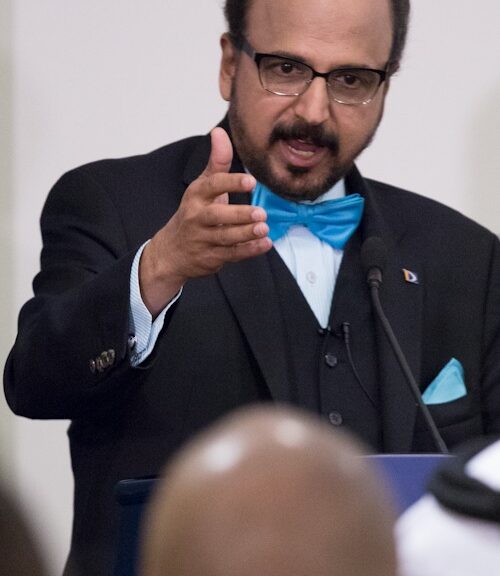CIRS Monthly Dialogue featuring R. Seetharaman, Group Chief Executive Officer of Doha Bank

R. Seetharaman, Group Chief Executive Officer of Doha Bank, delivered the first CIRS Monthly Dialogue of 2014 with a lecture on “Sustainable Development for Economies and Corporations” on January 20, 2014. Drawing on his experience as the head of a major financial institution, he explained how, as a result of the global financial crisis, economic systems all over the world have been shaken to their core and forced to undergo massive transformations at a fundamental level. These global financial institutions have had to align themselves according to a new world order of financial market re-regulation in the interest of creating more conservative, cautious, and sustainable global economies.
Seetharaman adumbrated the unprecedented circumstances that affected global financial systems over the past few years, including the liquidity crisis that turned into a funding and solvency crisis where entire nations such as Greece and Iceland experienced far-reaching economic collapse. In these cases, he argued, politics and economics did not speak to each other on the level of convergence that they should have. The liquidity crisis was addressed by unstable and short-term solutions, such as printing more money to improve the cash flow and to stabilize stock markets, but this was ultimately unsustainable. The problem was patched up on a superficial level, but the fundamental roots of the economic crisis remained. Because “we live in an interconnected, interdependent world,” currency markets and commodity markets are intertwined, and what affects one affects the other.
Reeling from years of global economic stagnation and recession, governments, corporations, and financial institutions have realized that massive overhauls in the system are necessary, Seetharaman explained. “This crisis is an opportunity for the new world order,” he advised. The type of rapacious corporate capitalism and market speculation that defined the last few decades of deregulated market economies have altered in form and substance. Similarly, countries that adhered to a socialist structure of economic governance have also found it necessary to change their financial structures, and have been making concerted efforts to end their isolation and connect with the global economy. In fact, Seetharaman said, these two formerly oppositional economic philosophies are increasingly becoming intertwined for a more effective and sustainable economic reality. “Mixed economies are the game changers. We have seen the emerging markets incrementally producing over 60% of gross domestic product in terms of global growth, and these economies have to be an integral part of the order of inclusive growth. This is why the G7 has become the G8, and G8 has become G20,” he said.
Because financial institutions operate as much on public money as they do on private shareholder assets, the public-private partnership model is the most sustainable way of moving forward, Seetharaman advised. Taking the example of Doha Bank, Seetharaman argued that private shareholder money accounts for approximately 11 billion, and yet customer deposits account for an enormous 35 billion. It thus becomes obvious that even if a financial institution is private, it is often, in reality, public. The global financial crisis revealed that the public is in fact an important stakeholder whose investments must be protected and not gambled with. “Whether you run a socially responsible mission as a corporate head or a country head, you have to practice social responsibility. That way, you will take care of all the stakeholders,” he explained.
In conclusion, Seetharaman argued that because of the increase in patterns of globalized connectivity on all levels, whether in terms of financial markets or broader issues of climate change, governance systems all over the world must attempt to adhere to the same ethical, socially-responsible, and sustainable standards. At the universal level, we need to “set new initiatives that are responsive to see the United Nation’s mission for eradication of extreme poverty, gender equality, economic sustainability, primary healthcare, education, global collaborations,” he concluded.
Dr. R. Seetharaman (www.seetharaman.org), Group Chief Executive Officer of Doha Bank, is a recipient of multiple doctorates from leading universities of the world, including a PhD in Global Governance by European University and Doctorate of Laws by Washington College. He is a Chartered Accountant and holds certificates in IT Systems and Corporate Management. He has been named “Best CEO in Middle East” and “World Leader Business Person” and is a recipient of “The Gullands Excellence Award as a Phenomenal Banker.” A regular commentator on international finance in global media outfits such as BBC, CNN, FOX, CNBC, Sky News, ABC, and Bloomberg, he has transformed Doha Bank as one of the best performing Banks in the Middle East region.
Article by Suzi Mirgani, Manager and Editor for CIRS Publications